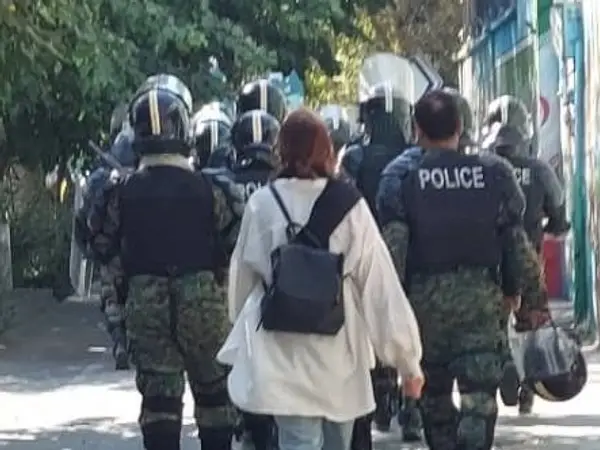Iranian protesters stayed away from streets at night in most places for a second night after widespread daytime protests in universities and secondary schools.
The atmosphere of many cities, however, is extremely volatile and smaller, flash mob style protests may erupt any moment in the most unexpected of places and spread to other areas, those familiar with the situation say. Some photos and videos posted on social media show the almost unprecedented deployment of female anti-riot officers on the streets of Tehran Tuesday evening.
A video posted on Twitter early evening showed cars blocking the street in front of an underground station on a busy street and honking their horns while a group of protesters chant on the street. Drivers resort to this tactic to prevent the vehicles and motorbikes of security forces from reaching the areas where protesters have gathered. Another video posted later showed people chanting on the same street (Shariati).
A video from the southern city of Bandar Abbas Tuesday shows people honking their horns on the street and security forces trying to take away some protesters while others chant “Scoundrels, Scoundrels”, a slogan often used when confronting security forces.
Across the country many university and high school students boycotted their classes and gathered on campuses Tuesday to demand the release of university students who have been detained in recent days in universities or at their homes. In their rallies students chant against the Supreme Leader and demand freedom and in some insitutionss such as Mashhad University Tuesday students chanted “This is not a protests anymore. It’s the beginning of a revolution!”.
A professor teaching to a completely empty classroom as university students boycot lectures
A video posted on Twitter Tuesday showed a diehard professor of Khajeh Nasir University in Tehran, where students held a large rally Tuesday, teaching to a completely empty classroom.
Dozens of students have been arrested by security forces in the past two weeks. Not all names of detainees have been made public so the total number is not known. In their protests students often chant “Evin has become a university” referring to the notorious Evin Prison in Tehran where most political prisoners are usually held.
Most Iranian universities are not gender-segregated but normally male and female students are required to sit separately in classrooms as well as in canteens and cafeterias but on Tuesday students at one of the universities in Tehran broke the taboo and sat together to eat. Some girls had flouted their headscarves, both were unimaginable only a few weeks ago. They also chanted the most-heard slogan of the protests, “Women, Life, Liberty” and clapped together. By breaking the rules, they have risked being expelled in the least.
Students have also been expressing, or supporting, grievances of ethnic groups who say they are discriminated against. “From Kordestan to Tabriz, Just poverty, corruption and discrimination,” university students chanted in Tabriz.
They have also been expressing support for the people of Zahedan, capital of the impoverished Sistan and Baluchestan Province in the southeast, where security forces opened fire on a Friday prayer congregation of Sunnis as they were returning to their homes. Local sources say the death toll has now risen to 80 people. “From Zahedan to Tehran, We will die for Iran!” students chant in response to hardliners and authorities’ who blame Baluchi separatists for the incident in Zahedan.
A top Sunni cleric, Molavi Abdolhamid, has confirmed that plainclothes security agents targeted the heads and hearts of unarmed protesters. Local Baluchi activists say arrests have continued in the province and security forces have been using helicopters and drones to shoot Baluchi citizens indiscriminately. Locals also say the number of those wounded in the attacks is so large there is a shortage of blood in hospitals.
